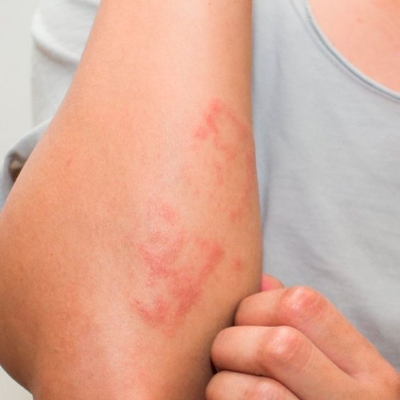What Is Atopic Dermatitis (Eczema)?
Atopic dermatitis, also known as eczema, is a long-term skin disorder characterized by itching, inflammation, and scaling. It is most common in infants and at that age is most frequently seen on the face and cheeks. Eczema can appear as soon as 6 weeks after birth. Fortunately, most atopic dermatitis in infants clears up by the time the child is 18 months old. Children with persistent eczema often have flat, red itchy areas in the creases of their elbows and wrists as well as behind their ears and knees, though it can occur in other locations.
Although the condition is most common in children, atopic dermatitis can also occur in adults, generally as a chronic or reoccurring condition. There is often a family history of hay fever, psoriasis, asthma, or another allergy-related disorder. Allergens and other irritants trigger atopic dermatitis.
Symptoms of Atopic Dermatitis
The signs and symptoms of atopic dermatitis vary from person to person. They include:
- Dry skin
- Itching, mild or severe, especially at night
- Red to brownish-gray patches on the hands, feet, ankles, wrists, neck, upper chest, eyelids, inside the bend of the elbows and knees, and in infants, the face and scalp
- Small, raised bumps that may leak fluid and crust over when scratched
- Thickened, cracked, scaly skin
- Raw, sensitive, swollen skin from scratching

Skin disorders may disappear then return after months or even years. Keeping the skin moisturized helps combat dry skin and other symptoms.
Atopic Dermatitis Diagnosis
Our allergists diagnose atopic dermatitis by examining the affected skin and reviewing your family and medical history. We may also use patch testing or other tests to rule out other skin diseases or identify conditions that accompany your eczema such as allergies. Allergies and atopic dermatitis are closely associated, known as the atopic march.
The atopic march suggests that patients who experience eczema as an infant, have a greater chance of developing allergies, specifically food allergies, and asthma as children and adults. Because of this risk of developing a food allergy, it is critical to see an allergist for allergy testing as early as possible. When a child’s eczema is under good control, their skin is better at preventing food allergens from getting in. If you suspect a certain food caused your child’s rash, call NY Allergy & Sinus Centers and ask about identifying potential food allergies.
Atopic Dermatitis Treatment
There are many different treatment plans for atopic dermatitis and may vary from person to person. Recognizing the symptoms early is your best chance for fast relief. Regular moisturizing should be apart of every treatment plan for skin disorders like eczema. Your doctor may also recommend medications that control itching and help repair the skin. These include corticosteroid creams or ointments. However, it is important to note that the overuse of these drugs may cause side effects such as thinning skin.
Doctors also prescribe other creams containing drugs called calcineurin inhibitors, such as tacrolimus (Protopic) and pimecrolimus (Elidel) to help control skin reactions. These drugs have a black box warning about a potential risk of cancer. But the American Academy of Allergy, Asthma & Immunology has concluded that existing data doesn’t support the use of the black box warning.
Treatment for atopic dermatitis may also include drugs to fight infection. Your doctor may prescribe an antibiotic cream or oral antibiotics if your skin has a bacterial infection, an open sore, or cracks due to scratching. He or she may recommend taking oral antibiotics for a short time to treat an infection.
For more severe cases, you may need prescribed oral corticosteroids, such as prednisone. These drugs are effective but should not be used long term because of potentially serious side effects. The Food and Drug Administration (FDA) has recently approved a new, injectable biologic called Dupixent. It is used to treat people with moderate-to-severe eczema. Book an appointment online or call our allergy specialists at (212) 686-6321 for your treatment plan.
Frequently Asked Questions
Atopic dermatitis is usually hereditary. However, certain irritants can trigger eczema flares. These triggers include pollen, pet dander or peanuts, stress, dry skin, and infection. Skin irritants such as some fabrics, soaps, and household cleaners may also trigger an atopic dermatitis flare.
Stress doesn’t directly cause eczema, but it can trigger symptoms. The body releases a hormone called cortisol when under stress. Large doses of cortisol increase inflammation throughout the body which can lead to an eczema flare.
Atopic dermatitis is a lifelong skin disorder. However, you may experience relief for long periods of time before another flare.
One of our allergists can diagnose atopic dermatitis by examining the affected skin. In some cases, you will need a patch test to determine what’s causing your eczema flare.
Atopic dermatitis is usually widespread, meaning it affects most parts of the body. Neurodermatitis is usually confined to one or two patches of skin, and it rarely goes away without treatment.
Infants and children are most likely to get atopic dermatitis. It can appear as soon as six weeks after birth.
No, atopic dermatitis is not contagious. You will not develop a skin disorder by being near someone who has it.
Atopic dermatitis usually does not cause a fever unless you develop an infection from scratching open wounds. If you develop a fever and chills, contact your doctor immediately.
Allergists may use a combination of corticosteroids, antihistamines, antibiotics, and moisturizers to treat neurodermatitis. Contact our NYC allergists for a personalized treatment plan.
Atopic dermatitis is a cause of eczema, which refers to skin conditions that cause inflammation and irritation. The terms are sometimes used interchangeably.

